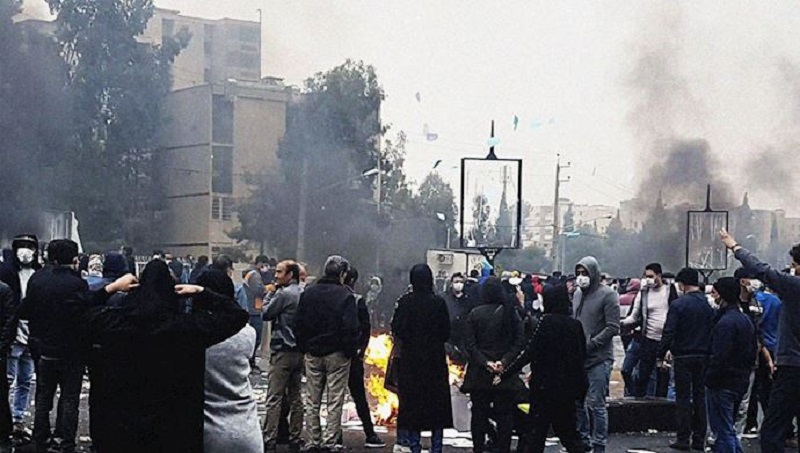
Last month, the Supreme Leader of the Iranian regime Ali Khamenei gave a speech to regime officials indicating that security against the ‘hard threat of the enemies’ and the ‘enemies within’ Iranian society is the regime’s most important issue. As the two-year anniversary of Iran’s 2019 uprising approaches, the regime is even more concerned that the current protests will escalate to the same level.
Even Iran’s state media are echoing the regime’s fears, with the Aftab-e Yazd outlet warning at the end of October that ‘millions will have nothing to lose and will resort to violence’, in response to the increasingly restive society who are protesting for their rights amidst Iran’s worst economic crisis.
The National Council of Resistance of Iran (NCRI) said, “The November 2019 uprising encompassed nearly 200 Iranian cities and towns and featured stark anti-government slogans such as ‘death to the dictator’ as well as statements rejecting both the ‘hardline’ and ‘reformist’ factions of the regime’s political structure.”
This uprising was the follow-up to an earlier uprising in January 2018 which spread across 100 localities. During the earlier bout of protests, Khamenei acknowledged the uprising had been ‘planned for months’ by the People’s Mojahedin Organization of Iran (PMOI/MEK), the regime’s long-feared opposition group.
Following Khamenei’s speech, warnings began to fly from fellow cleric and Revolutionary Guard (IRGC) officers of the potential threat of further unrest. This led to an increase in more repressive actions when dealing with Iranian citizens at protests and prompted Khamenei to begin consolidating power within the regime.
Later in 2018, Ebrahim Raisi was appointed by Khamenei to the role of head of the judiciary. By the time of the November 2019 uprising, Raisi had firmly adjusted to his new role and played a major role in the regime’s brutal crackdown on the uprising. Following orders from Khamenei to restore order during the protests by doing ‘whatever it takes’, security forces opened fire on the crowds and judiciary officials subjected thousands of people, who had been arrested, to months of torture in detention.
The NCRI said, “Within only days of the November 2019 uprising breaking out, at least 1,500 people were fatally shot. A complete death toll is difficult to ascertain, given the absence of records regarding those who might have died under torture or succumbed to their wound later while being held within the harsh conditions of Iranian detention facilities.”
In September 2020, Amnesty International published details of the torture that took place as part of a report on the regime’s brutal crackdown of the demonstrations during the uprising. In April of this year, they issued a further statement declaring that the death penalty was used ‘as a weapon of political repression against dissidents, protesters and members of ethnic minority groups’, which is in complete violation of international law.
The NCRI said, “Further evidence for that conclusion came in June with Raisi’s appointment to the presidency, which the MEK publicly regarded as a reward for his role in the previous year’s crackdown, as well as in prior human rights abuses including what the Iranian regime’s single worst crime against humanity.”
Following the MEK’s sentiment, many Iranians protested Raisi’s candidacy and declared him ‘the henchman of 1988’, in reference to his heavy involvement in the massacre of political prisoners that took place in the summer of 1988.
In a conference in July of this year, the President-elect of the NCRI Maryam Rajavi gave a statement as Raisi was selected at the regime’s new president and warned, “in the new era, the hostility and enmity between the Iranian regime and society will intensify more than ever before.”
The NCRI said, “The anniversary of the 2019 uprising is another reminder of that test and will surely be presented to the international community as another opportunity to hold the regime and its officials accountable for historic and ongoing human rights abuses and crimes against humanity.”